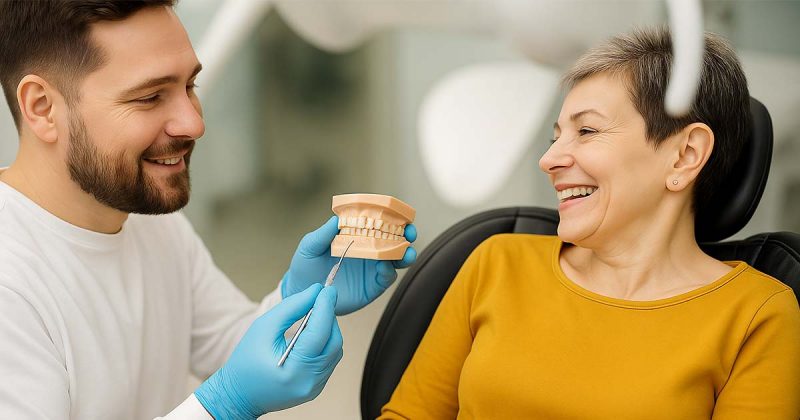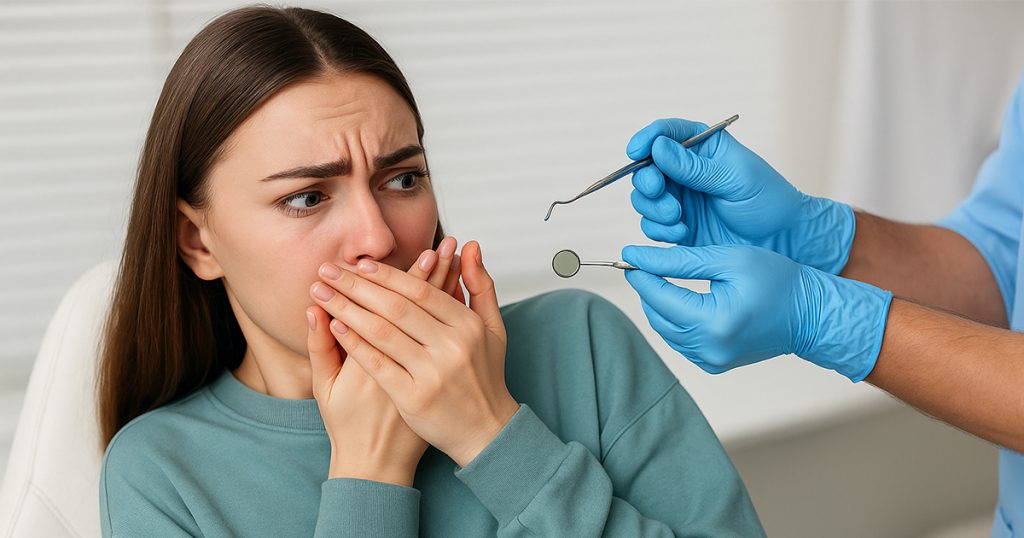Overcoming Dental Anxiety: Your Smile Is More Important Than Fear

A trip to the dentist can be stressful for most. There are those who fear pain, others fear tools, and a few who have a negative experience in the past that keeps them at bay. This is dental anxiety and it’s more prevalent than you would imagine. However, avoiding the dentist because of fear can do more harm to your oral health and overall health.
In this blog, we will discuss what dental anxiety is, why it matters, how it affects oral health, and easy steps to conquer it so you can maintain your teeth without fear.
What is Dental Anxiety?
Dental anxiety is a worry, fear, or apprehension related to visiting the dentist. It falls on the mild to extreme level of phobia.
Some patients:
- Become tense when they think about dental appointments.
- Struggle to sleep the night before an appointment.
- Postpone or avoid treatment altogether.
- Fact: Studies show that nearly 1 in 3 people experience dental anxiety at some level.
Why It Matters?
- Forgetting dental treatment due to anxiety can result in:
- Cavities left untreated → leading to acute pain and infection.
- Gum disease → and eventually tooth loss.
- Higher cost of treatment in the future through complications.
- Regular dental visits aren’t all about fixing things—they’re about preventing them, too.
Causes of Dental Anxiety
Every patient is different. Here’s the explanation:
| Cause of Anxiety Description |
| Fear of pain: Worry that treatment will be painful. |
| Needles & injections: Worry about dental shots. |
| Drill sounds & instruments: The visual and auditory stimulus can be too much. |
| Loss of control: Sense of helplessness in the dental chair. |
| Past negative experiences: Painful or unpleasant past experiences. |
| Embarrassment: Fears about the appearance of teeth or oral hygiene. |
How Oral Health Is Affected by Dental Anxiety?
Steering clear of the dentist because of fear can initiate a vicious cycle:
Stage Effect of Avoidance:
- Time of regular check-ups is delayed.
- REQUIREMENT for more advanced (and costly) treatments.
- Anxiety mounts due to more extensive procedures needed.
This cycle demonstrates the way untreated fear can destroy both confidence and health.
What are some ways to Conquer Dental Anxiety?
The good news is that Dental anxiety can be overcome using some simple techniques in day-to-day procedures:
- Talk with Your Dentist and Be honest about your anxieties. Getting explanations of procedures in detail from your dentist will help you calm down. You can also request frequent breaks while being treated.
- Gradual Exposure with the procedure- Start with simple, non-probing visits like cleaning or check-ups prior to going on to more intricate treatments.
- Relaxation Techniques- Deep breathing exercises such as Slowly breathing in, hold, then exhale. You can also try meditation.
- Sedation Options- For patients with severe anxiety Nitrous oxide (laughing gas). Oral sedatives and IV sedation (in rare cases)
- Bring Support with you during treatment- Having someone familiar, a family member or friend, present with you can ease fear.

Coping Strategies at a Glance:
| Strategy | How It Helps |
| Talking to dentist | Creates trust and eliminates uncertainty. |
| Deep breathing exercises | Calms body and reduce stress. |
| Gradual exposure | Reduces fear slowly. |
| Listening to music | Diverts attention away from sounds and feelings. |
| Sedation (if needed) | It helps relax during challenging procedures. |
| Support person | Provides emotional reassurance and encouragement. |
Role of Dentists in Reducing Anxiety
Modern dentists are trained not just in procedures but also in patient relaxation. They:
- Use pain-free anesthetic procedures.
- Practice warm communication.
- Create peaceful, patient-focused environments.
Tip for Dentists: A friendly waiting area, clear communication, and reassurance to patients can significantly ease fear.
Fun Facts About Dental Fear
- Dentist fear has a name: dentophobia.
- Children often acquire dental anxiety from parents.
- The majority of patients say the noise of the drill is scarier than the process itself.
- Advances in technology (laser dentistry and needle-free anesthesia) are making it less intimidating to go to the dentist.
FAQs
Q1. Is dental anxiety the same as dental phobia?
No. Anxiety is shown through nervousness, but phobia is an exaggerated, irrational fear that could discourage any visit to the dentist.
Q2. Can relaxation actually work?
Yes, meditation, deep breathing, or even squishing a stress ball will reduce anxiety.
Q3. Are children more anxious to see the dentist?
Yes. Initial positive experiences are the key to developing comfort.
Q4. Will the dentist judge me because of my bad teeth?
Not at all. Dentists are there to help, not to judge.
Q5. Can technology help make going to the dentist less frightening?
Yes. New technology reduces noise, vibration, and pain treatments less intimidating.
Conclusion
Dental anxiety is real, but it does not stop you from maintaining healthy gums and teeth. With the correct strategies such as communication, relaxation, incremental exposure, and modern sedation techniques you can conquer fear with ease. Healthy gums and teeth are long-term investments. Allow fear not to stand in the way of your smile.

No Comment